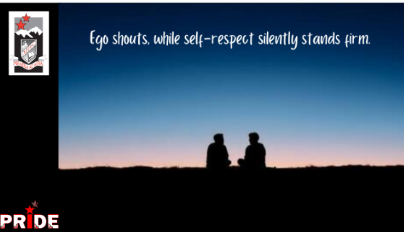Self Respect

"Ego shouts, while self-respect silently stands firm."
The Quest for Validation (Loud vs. Quiet Pride)
Which are you more likely to say? - ‘I got the highest score, you all scored way lower than me,’ or, ‘I’m proud of the work I put into that’? ‘Good game,’ or ‘They cheated’?
- Ego's demand:
The ego needs constant external praise, seeks validation from others, and its worth is fragile - reliant on opinions of others.
- Self-respect's inner strength:
Self-respect is the quiet, internal confidence that comes from knowing who you are and what you stand for. It forms a much stronger foundation, built on your own values, that can't be shaken by what others think.
- Listen to the difference between, ‘Good game’ & ‘they cheated,’ ‘I’m proud of the work I put into that’ & ‘I scored higher than all of you.’ What drives them?
Navigating Challenges and Criticism (Defensive vs. Reflective)
- Ego's reaction: When the ego is faced with a mistake or criticism, it immediately gets defensive. It shifts blame, gets angry, or shuts down, making it difficult to grow as a person.
This is what that might sound like:- (Receiving a bad grade) "This teacher has it out for me. The questions were totally unfair anyway."
- (Getting feedback on a project) "I can't believe you said that. My work is perfect. You just don't get it."
- (After a mistake) "It wasn't just me! They were all doing it too."
- Self-respect's calm response: A person with self-respect can calmly accept feedback. They understand that a single mistake doesn't define them. They can separate the criticism from their identity and this allows them to see challenges as opportunities, not as threats.
This sounds a lot more like:
- (Receiving a bad grade) "Okay, that grade isn't what I wanted. I'm going to ask the teacher what I can improve on next time."
- (Getting feedback on a project) "Thanks for the feedback. I can see how that part could be clearer. I'll make some changes."
- (After a mistake) "Yeah, that was on me. I should have paid closer attention. I'll make sure it doesn't happen again."
Making Tough Choices (Popular vs. Principled)
- Ego's compromise: The ego chooses the easy or popular path, prioritizing fitting in over what's right.
You can often hear the ego at work in situations like:
- (Facing peer pressure) "I know it's a bad idea, but everyone else is doing it, and I don't want to look uncool."
- (Seeing a friend get bullied) "I'm just going to stay quiet. I don't want to get involved and have them turn on me too."
- (Copying a classmate's homework) "It's just this one time. I didn't have time to do it, and I can't get a zero."
- Self-respect's firm stand: Self-respect has the courage to stand by personal values, even when difficult or unpopular.
This looks like:
- (Facing peer pressure) "Thanks for the offer, but it’s not for me. I'm going to head home."
- (Seeing a friend get bullied) "Hey, that's not cool. Leave them alone."
- (Deciding not to cheat) "I'm not confident in this, but cheating won’t help me improve."
Lastly, Navigating Friendship Struggles (Control vs. Care)
Our friendships are one of the most important parts of our lives, and they’re often where the battle between ego and self-respect plays out most clearly.
When an ego is involved in a disagreement with a friend, it wants to win the argument. It’s not about finding a solution; it’s about being right. You might hear the ego say:
- (After an argument) "I'm not talking to them until they admit they were wrong."
- (When a friend is upset) "Why are you so mad at me? I'm the one who should be mad, not you."
But when you approach a friendship with self-respect, the goal is to preserve the relationship, not your pride. You understand that the connection is more valuable than winning a petty argument. This is what self-respect sounds like:
- (After an argument) "Hey, I know we were both upset. Can we take a minute and just talk this out? I value our friendship."
- (When a friend is upset) "I can tell you're hurt, and I'm really sorry if I caused that. Let's figure out what we can do to make this better."
So, How Do We Make the Shift?
So how do we actually move from being ego-driven to self-respect-driven? It’s a conscious choice, and it's a practice that takes time
First, stop seeking external validation. Every time you feel the urge to show off or brag, ask yourself: Am I looking for a compliment, or am I genuinely proud of what I did? Learn to find your own satisfaction in a job well done, & trust your own feelings of pride.
Second, practice self-reflection, not defensiveness. When you make a mistake, don’t immediately jump to a reason why it wasn't your fault. Instead, take a moment to be quiet. Acknowledge your own fallibility and ask yourself: What can I learn from this? What will I do differently next time? This is the path to growth, and it’s a sign of immense strength.
Finally, define your values and live by them. What matters most to you? Is it honesty? Integrity? Kindness? Write them down. When you're faced with a tough choice, whether it’s a temptation to cheat or a social situation that feels wrong, think about your list. Ask yourself: Which choice aligns with who I want to be? When you choose self-respect, you build your character, silently but surely.

